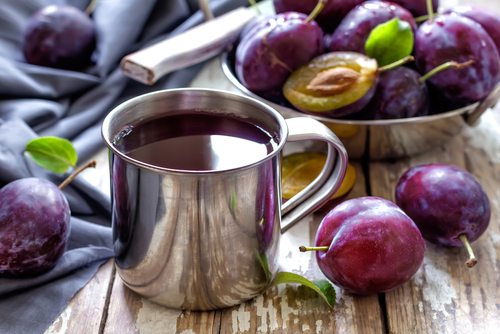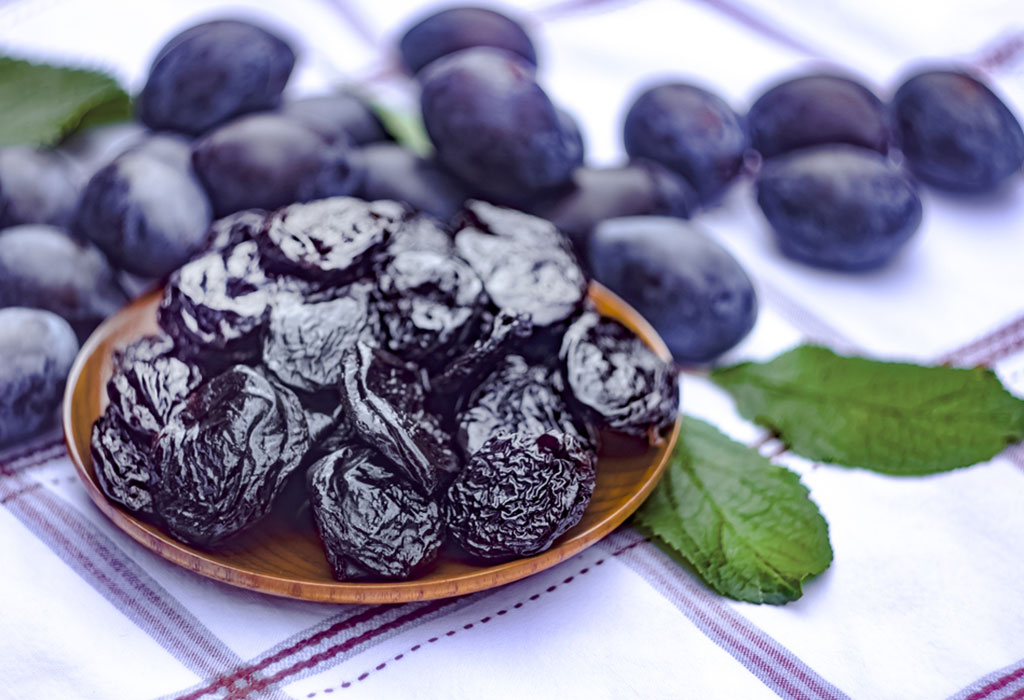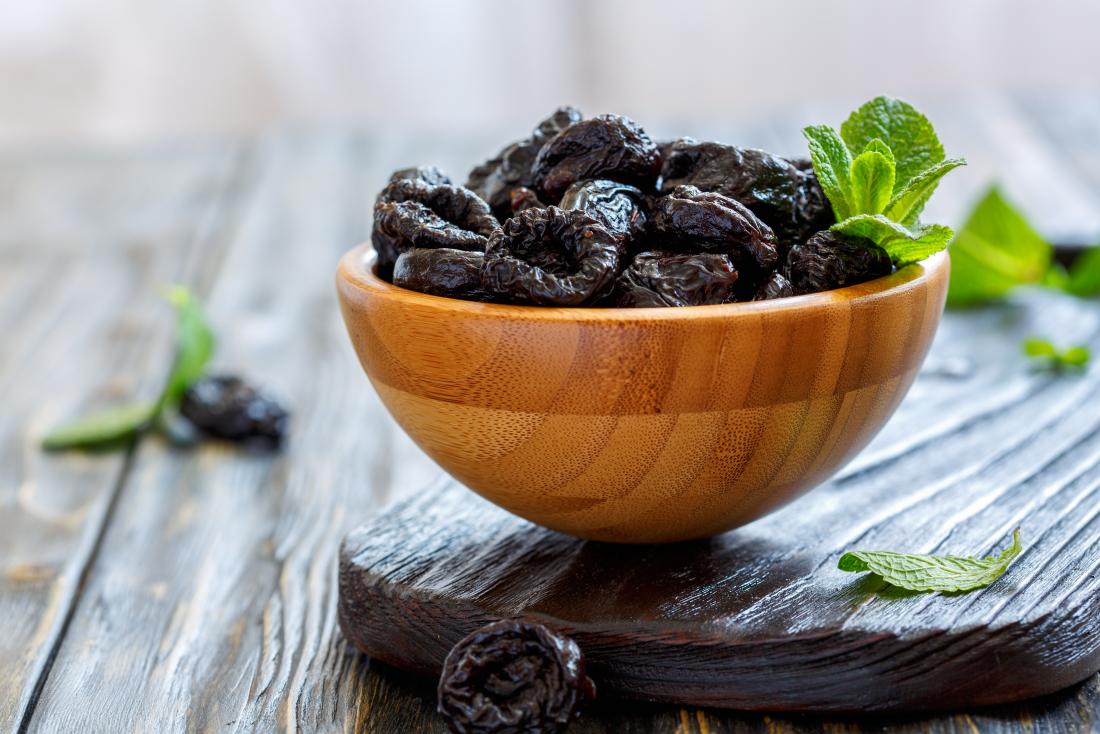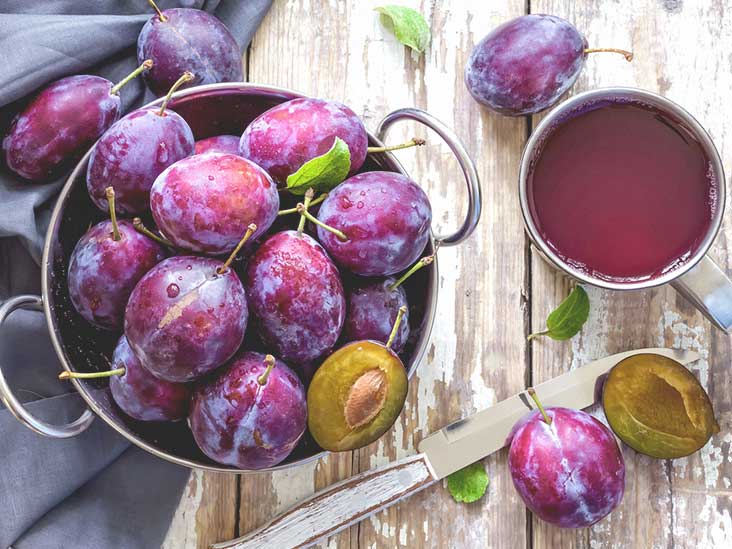Benefits Of Prunes and Prune Juice: The Dry Fruit You have Ignored For Too Long
Overview
Staying hydrated is a great way to protect your organs, and it’s also one of the secrets to healthy skin.
Drinking the recommended eight glasses of water per day is good for this. But one way to add some extra flavor and nutrients to your day is by including prune juice in your diet.
Prune juice is made from dried plums, or prunes, which contain many nutrients that can contribute to good health. Prunes are a good source of energy, and they don’t cause a rapid hike in blood sugar levels.

Prunes have a high sugar content, which allows them to be dried without fermenting. They’re also high in fiber, which can help you regulate your bowels and your bladder.
Here are 11 top health benefits of prunes and prune juice.
1. Helps digestion

Prunes are high in fiber, which helps prevent hemorrhoids brought on by constipation. Chronic constipation is a common problem in older adults and can also be a painful problem for infants. Prune juice acts as a laxative thanks to its high sorbitol content. Ask your doctor if it’s right for you or your child.
A serving size of six prunes has 4 grams of dietary fiber, and 1/2 cup contains 6.2 grams.
“Dietary guidelines for Americans: 2015-2020” recommends that women 30 years and younger get 28 grams of fiber each day, and men in this same age group get 34 grams. Women and men between 31 and 50 years of age should aim for 25 g and 30 g of fiber, respectively. The recommended fiber intake for women and men over 51 is still less, at 22 g and 28 g, respectively.

While prune juice doesn’t contain the same amount of beneficial fiber as the whole fruit, it still retains some fiber and many of the vitamins and minerals that the whole fruit provides.
2. Controls the urge
An overactive bladder can be uncomfortable to deal with, but adding fiber to your diet can help. While an overactive bladder can be caused by many things, sometimes constipation can increase the frequency of urination.
To help regulate your bowels, the Cleveland Clinic recommends increasing your fiber intake by taking 2 tablespoons of the following mixture every morning:
- 3/4 cup prune juice
- 1 cup applesauce
- 1 cup unprocessed wheat bran
3. High in potassium
Prunes are a good source of potassium, an electrolyte that assists in a variety of vital bodily functions. This mineral helps with digestion, heart rhythm, nerve impulses, and muscle contractions, as well as blood pressure.
Since the body doesn’t naturally produce potassium, consuming prunes or prune juice can help you avoid deficiencies. Just be wary of getting too much!
A 1/2-cup portion of prunes contains 637 milligrams of potassium. This accounts for nearly 14 percent of your daily recommended amount. Most adults should consume about 4,700 mg of potassium a day.
4. High in vitamins
Prunes aren’t just high in potassium — they also contain lots of key vitamins. A 1/2-cup portion of prunes contains:
5. Provides a good source of iron
Anemia occurs when the body doesn’t have enough healthy red blood cells, which iron helps to make. Shortness of breath, irritability, and fatigue are all signs of mild anemia. Prune juice is a great source of iron and can help prevent and treat iron deficiency.
A 1/2 cup of prunes contains 0.81 mg of iron, which provides 4.5 percent of the FDA’s percent daily value. A 1/2 cup of prune juice, on the other hand, contains 3 mg, or 17 percent.
6. Builds bones and muscles

Dried prunes are an important source of the mineral boron, which can help build strong bones and muscles. It may also help with improving mental acuity and muscle coordination.
Prunes may be especially beneficial in fighting bone density loss from radiation. A 2016 animal study found that dried plums and dried plum powder can reduce radiation’s effect on bone marrow, preventing bone density loss and promoting bone health.
Prunes even have some potential as a treatment for osteoporosis. Another study presented evidence that dried plums can prevent loss of bone mass in postmenopausal women who are prone to osteoporosis. Only 50 g (or five to six prunes) a day were necessary to see benefits.
7. Reduces cholesterol levels
Fat and cholesterol can collect in your arteries to form a substance called plaque. When plaque builds up in your arteries, it can cause atherosclerosis, a narrowing of the arteries. If left untreated, this condition can lead to heart failure, stroke, and heart attack.
Research suggests that dried prunes may help slow the development of atherosclerosis. There are a few possible reasons for this. One animal study found that the antioxidants in prunes can have a positive effect on cholesterol levels. Another study reported that soluble fiber, which is found in prunes, may help reduce cholesterol levels.
8. Lowers blood pressure
Scientists have shown that eating prunes and drinking prune juice can significantly reduce blood pressure. For instance, a 2010 study reported that blood pressure was reduced in groups that were given prunes daily.
9. Helps reduce appetite

Prunes can help you manage your weight. They do this by keeping you feeling full for longer. The reason for this is likely twofold.
First, prunes contain lots of fiber, which is slow to digest. Slower digestion means your appetite stays satisfied for longer.
Second, prunes have a low glycemic index. This means they raise the glucose (sugar) levels in your blood slowly. This may in part be due to their high amounts of sorbitol, a sugar alcohol with a slow absorption rate. Avoiding spikes in your blood sugar levels, which can be caused by foods with a high glycemic index, can help keep your appetite at bay.
A 2009 study found that eating dried plums as a snack can suppress hunger for longer than a low-fat cookie. If you’re on a weight-loss program, you may want to consider adding prunes to your diet.
10. Protects against emphysema
Chronic obstructive pulmonary disease (COPD), including emphysema, is a chronic lung disease that leads to trouble breathing. There are multiple causes, but smoking is by far the most common direct cause of both.
A 2005 study showed positive correlations between lung health and a diet rich in antioxidants. A more recent study states that plant polyphenols, including antioxidants, may reduce risk of COPD.
Prunes contain high levels of antioxidants, which can fight the damage that smoking causes by neutralizing oxidation. This may help to reduce the likelihood of emphysema, COPD, and lung cancer, though no studies have specifically looked at prunes for lung health.
11. Lowers risk of colon cancer
Colon cancer is often hard to detect, but it can be aggressive. Diet can help prevent colon cancer, and research has shown that adding dried plums to your diet may reduce your risk.
A study conducted by Texas A&M University and the University of North Carolina determined that eating dried plums can positively affect and increase microbiota (or beneficial bacteria) throughout the colon. This, in turn, can reduce the risk of colon cancer.
Possible side effects of prunes and prune juice
Although they’re tasty and have many health benefits, prunes and prune juice can also have a few negative effects.
Digestive upset
- Gas and bloating. Prunes contain sorbitol, a sugar that can cause gas and bloating. Fiber, also contained in prunes, can also cause gas and bloating.
- Diarrhea. Prunes contain insoluble fiber, which can cause or worsen diarrhea.
- Constipation. When you increase your intake of fiber, it’s important to drink enough fluids. If you don’t, you could get constipated. So be sure to drink plenty of water when adding prunes to your diet.
To avoid these problems, introduce prunes into your diet slowly. This will give your digestive system time to adjust to them, and symptoms of gastrointestinal upset should be reduced.
Weight gain
While adding prunes and prune juice to your diet can help with weight loss, consuming them with abandon can have the opposite effect.
A serving size of six uncooked prunes (or 57 g) has 137 calories and 21.7 g of sugar. A 1-cup serving of prune juice has about 182 calories. So you should be mindful of the calories and sugar in these food items, which can add up if you consume them often throughout the day.
Impact on certain health conditions
Be sure to ask your doctor if prunes or prune juice is right for you. High-fiber foods and drinks can have a negative effect on people with certain diseases, such as ulcerative colitis.
Other potential side effects and a caution
Prunes do contain trace amounts of histamine, so it’s possible (though uncommon) to develop an allergy to them. Should you experience allergy symptoms that you think are related to consuming prunes or their juice, stop eating prunes or drinking prune juice and consult a doctor.
Through the drying process, prunes form a chemical known as acrylamide in very small traces. This chemical, which is found in much higher concentrations in foods such as potato chips and french fries, is considered to be a carcinogen by the National Cancer Institute.
If you eat a diet full of whole, fresh foods, the risk of acrylamide contamination from prune juice is extremely low (but higher for smokers).
You shouldn’t drink prune juice if you’re already experiencing diarrhea.
Adding more prunes to your diet
Prunes come with a large number of health benefits and can improve digestion while offering needed nutrients. Some people, however, may find it difficult to incorporate prunes into their diet.
Here are some easy ways to add prunes to your diet:
- Eat them alone as a snack.
- Add prunes to your breakfast oatmeal.
- Mix them with nuts, other dried fruits such as apricots, and dark chocolate chips for a healthy trail mix.
- Add them to baked goods.
- Blend them (or use prune juice) for drinks or smoothies.
- Puree prunes and eat them as “prune butter” or jam.
- Add them to a savory stew.

Adding prunes to your diet can be much easier — and more fun — than you’d think. For best results, make sure that you gradually increase your fiber intake and drink enough water.







